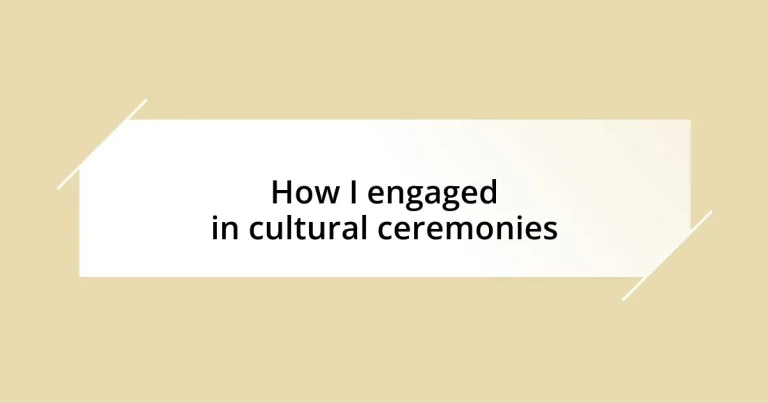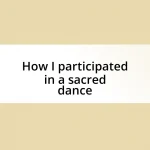Key takeaways:
- Cultural ceremonies connect individuals to their heritage and foster a sense of belonging through shared experiences and emotions.
- Preparation and understanding cultural etiquette enhance participation, making the experience more meaningful.
- Active engagement, such as sharing stories and participating in rituals, fosters deeper connections with others and enriches personal understanding.
- Reflection on experiences leads to greater appreciation of cultural significance and fosters a sense of interconnectedness among diverse communities.
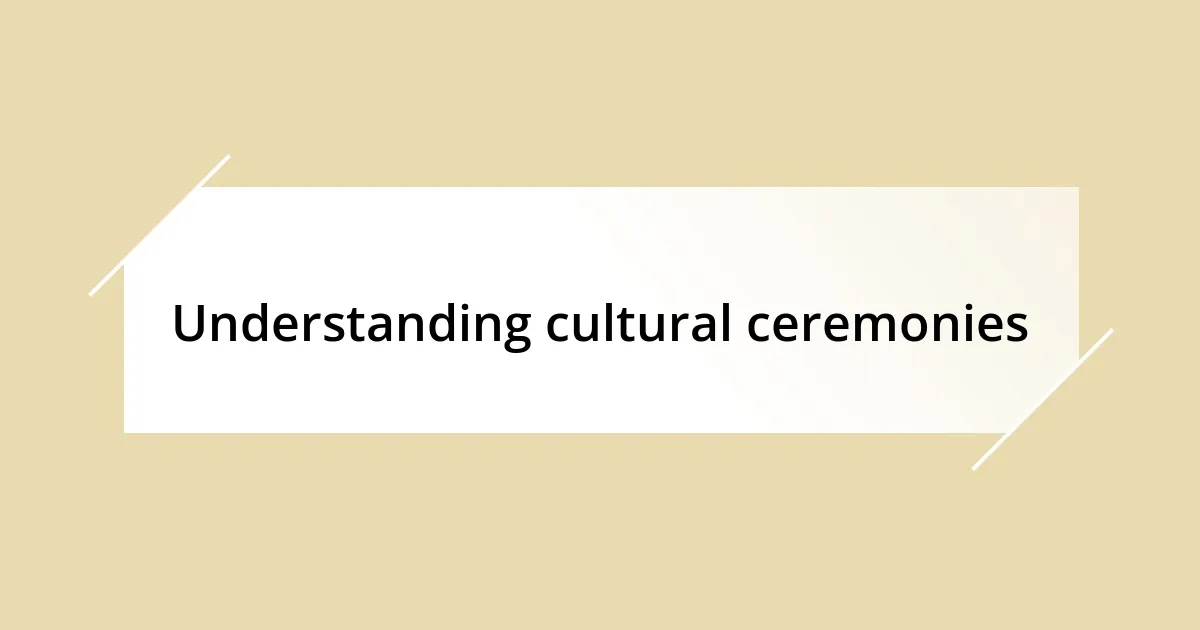
Understanding cultural ceremonies
Cultural ceremonies serve as a bridge connecting individuals to their heritage, traditions, and communities. I remember attending a vibrant Diwali celebration, where the air was thick with sweet aromas and the flickering lights felt like whispers of history. Hasn’t everyone experienced that moment when a ceremony makes you feel like you are part of something bigger?
Understanding these ceremonies goes beyond the rituals; it’s about the emotions they evoke. For instance, during a friend’s wedding, I found myself overwhelmed as family members shared heartfelt stories, each one revealing threads of love and sacrifice interwoven through generations. It made me question how these shared experiences shape our identities.
Each cultural ceremony is a tapestry woven with unique threads—beliefs, values, and emotions that resonate deeply within us. I often wonder: what stories would my own life tell if laid out in a cultural ceremony? Engaging in these moments allows us to reflect on our own journeys while honoring the collective spirit of our communities.
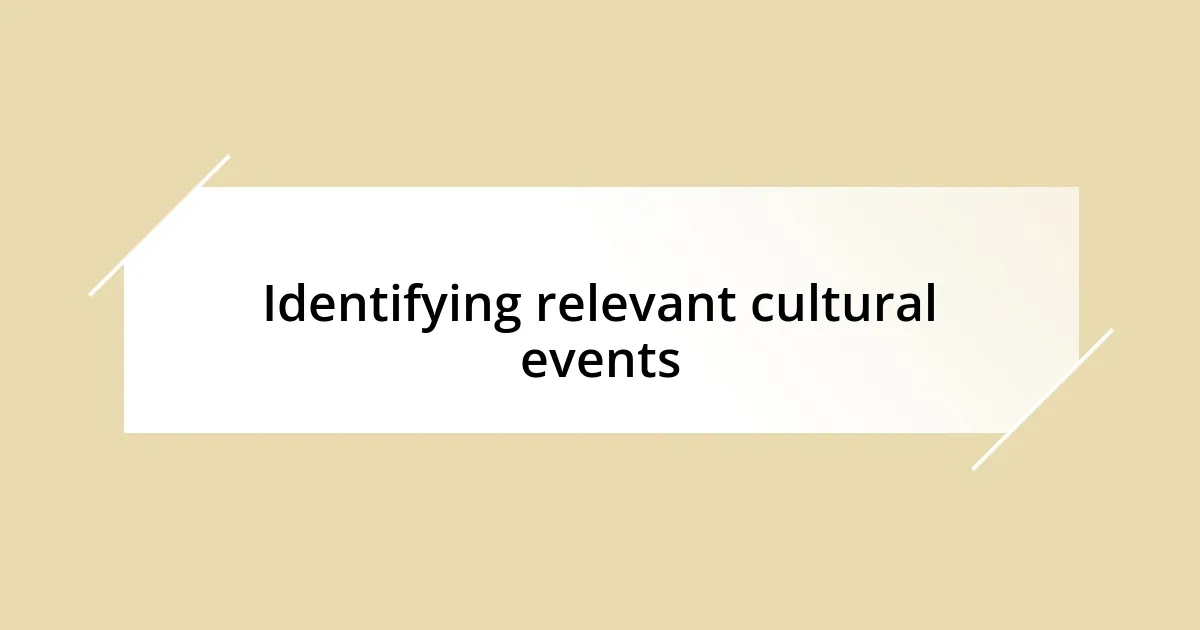
Identifying relevant cultural events
Identifying cultural events that resonate with you can feel like a personal journey. I remember scrolling through community boards and social media, seeking events that sparked an inner connection. The joy of discovering a local festival celebrating my ancestral roots was exhilarating; it felt like uncovering a hidden treasure in my own backyard.
When exploring cultural events around you, consider several key aspects:
- Personal Heritage: Look for events related to your own background or ancestry.
- Community Engagement: Seek out local gatherings that foster a sense of belonging.
- Cultural Interest: Identify events that pique your curiosity about different traditions.
- Seasonal Celebrations: Pay attention to festivals tied to seasons or holidays that bring communities together.
- Creative Expressions: Attend art exhibits, performances, or workshops that showcase cultural expressions.
Engaging deeply with these aspects opens up a world of rich experiences waiting to be explored.
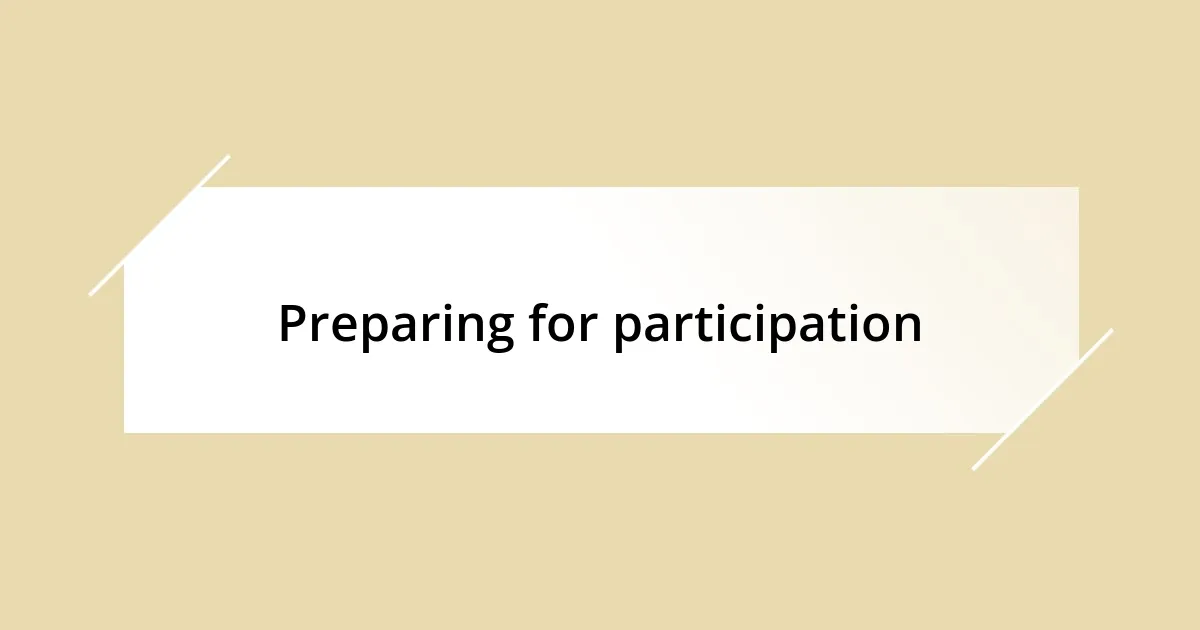
Preparing for participation
Preparing for participation in cultural ceremonies involves a blend of research, intent, and the right mindset. Before I attended a traditional Brazilian Carnival, I immersed myself in the history and significance of the celebration. It wasn’t just about the glitter and samba; it was about understanding the roots of joy and resilience that thrived even in challenging times. This preparation deepened my appreciation and allowed me to move beyond being just a spectator to truly engaging in the experience.
I’ve found that connecting with individuals from the culture can illuminate aspects of the ceremony that research alone might miss. Chatting with a friend who grew up participating in Holi revealed personal stories of joy and mishaps that weren’t in any guidebook. Their excitement was infectious! This interaction made me realize that preparation isn’t only about knowledge; it’s also about relationships and open-heartedness. How often do we let conversations enrich our experiences?
Lastly, thinking about attire and personal contributions can enhance your involvement significantly. For my first time at a Lunar New Year celebration, I chose to wear red, symbolizing luck. I even brought handmade dumplings to share, which made me feel more connected. Each small detail added to my sense of belonging. Participation in a cultural ceremony is as much about the emotional and personal connection as it is about the events themselves, making the experience more memorable and fulfilling.
| Factor | Importance |
|---|---|
| Research | Allows deeper understanding of history and significance |
| Community Connections | Brings personal stories and insights |
| Attire and Contributions | Enhances feeling of belonging and engagement |
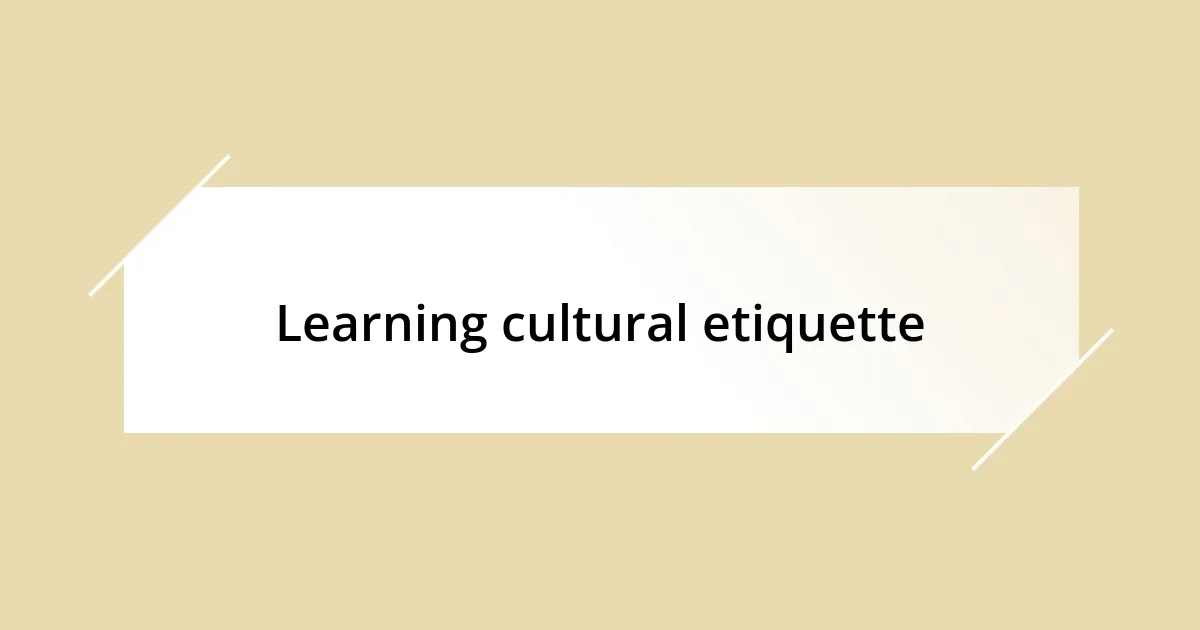
Learning cultural etiquette
Learning cultural etiquette is crucial for meaningful participation in ceremonies. I remember my first experience at a traditional Indian wedding; it wasn’t just about the colors and music. I felt a wave of nervousness about whether I could follow the customs properly. Understanding things like the significance of removing my shoes before entering the venue made me realize how much these small gestures symbolize respect and appreciation for the culture.
As I delved into researching cultural norms, I found it enlightening to learn about the unspoken rules that govern behavior in different settings. For instance, during a tea ceremony in Japan, I learned that it’s polite to receive tea with both hands and to express gratitude with a bow. I practiced this beforehand, and when the moment came, I felt an immense sense of connection to the host, as if I was participating in something much deeper than just the ritual itself. Isn’t it remarkable how these customs can foster intimacy among strangers?
Engaging with locals can also significantly enhance understanding of cultural etiquette. I recall chatting with my neighbor from Vietnam before my first Tet celebration. He shared insights about how age plays a crucial role in introducing oneself during the festivity. This conversation not only calmed my nerves but also made me feel part of the community. It’s often these small exchanges that illuminate the heart of a celebration. Have you ever noticed how a simple conversation can deepen your appreciation for an experience?
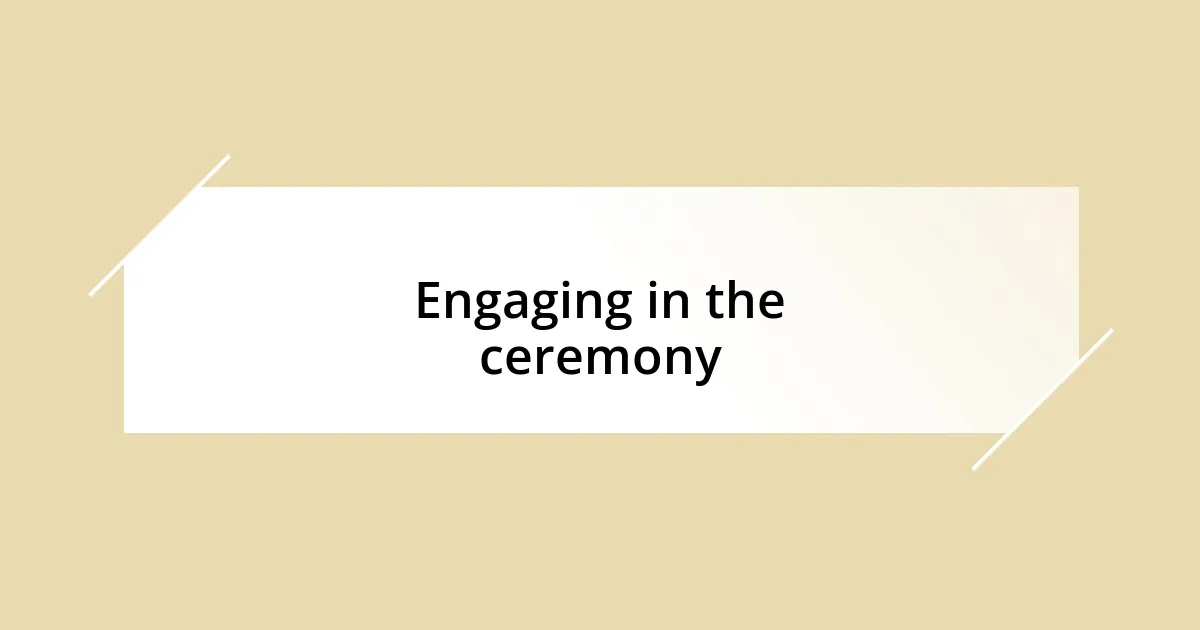
Engaging in the ceremony
Engaging in a cultural ceremony is like stepping into a vibrant tapestry of tradition and emotion. When I attended a Day of the Dead celebration in Mexico, my senses were overwhelmed by the colors, scents, and laughter. I remember standing beside an altar, feeling a mix of joy and reverence as I placed a marigold in homage to the loved ones remembered. That moment was electric; it anchored me in the rich history that surrounded me. Have you ever felt such a powerful connection to a place through its rituals?
As I participated in a traditional dance, my initial self-consciousness faded with each step, replaced by a profound sense of community. The music was infectious, and I found myself lost in the rhythm. I could see smiles all around me, everyone moving together, creating a bond that transcended language. At that moment, I realized how these ceremonies are not just performances; they embody shared stories and collective spirit. It’s remarkable how allowing oneself to be vulnerable in this way can create such an intimate connection, isn’t it?
Moreover, actively engaging in cultural ceremonies often leads to unexpected lessons. At a Native American powwow, I learned about the significance of storytelling and how it preserves history. I remember an elder sharing his tale around a fire, captivating us all. I felt the weight of his words, and it struck me how these experiences invite us to reflect on our own narratives. In this way, participating becomes a two-way street; we’re not just observers, but contributors to the ongoing story of a culture. How can we carry these lessons forward into our own lives?
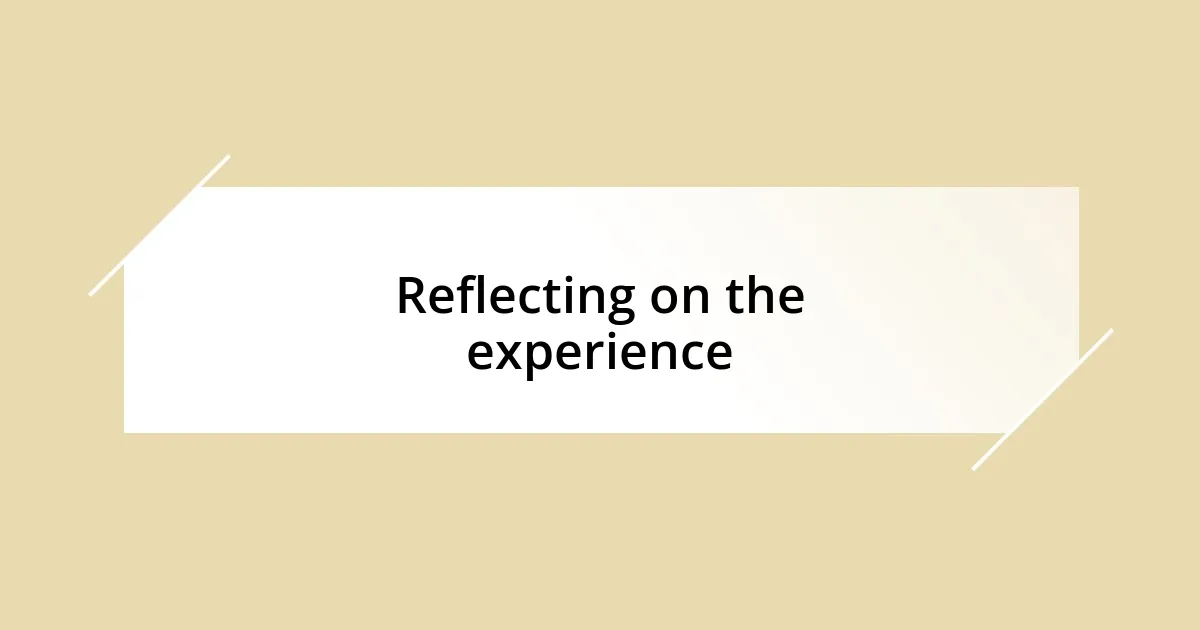
Reflecting on the experience
Reflecting on the experience is truly a profound journey. After my participation in the Diwali festival, I found myself still caught up in the warmth of the lights and laughter days later. I couldn’t help but reminisce about the moments spent lighting diyas alongside families eager to share their traditions. It struck me how this celebration of light symbolizes hope and the triumph of good over evil, prompting me to think about the light I could bring into my own life.
In quieter moments of reflection, I questioned my own connections to these cultures. I recalled an intimate exchange when a grandmother at the Diwali celebration shared the meaning behind every ritual. Her eyes sparkled with joy as she spoke, and I felt her wisdom resonate within me. Have you ever encountered someone whose passion for their culture made you rethink your own heritage? For me, it opened a door to not only respect their customs but also to value the threads of my own history.
This deep inquiry brought about a new understanding of belonging. I remember feeling a pang of homesickness at first; I thought I’m just an outsider. Yet, as the ceremony unfolded and I engaged in shared laughter and heartfelt stories, I realized that such events create bonds that transcend borders. Isn’t it fascinating how the sharing of traditions can weave us into a larger tapestry of human experience? Through this lens, I began to see cultural ceremonies as a mirror, reflecting both our individuality and our interconnectedness.
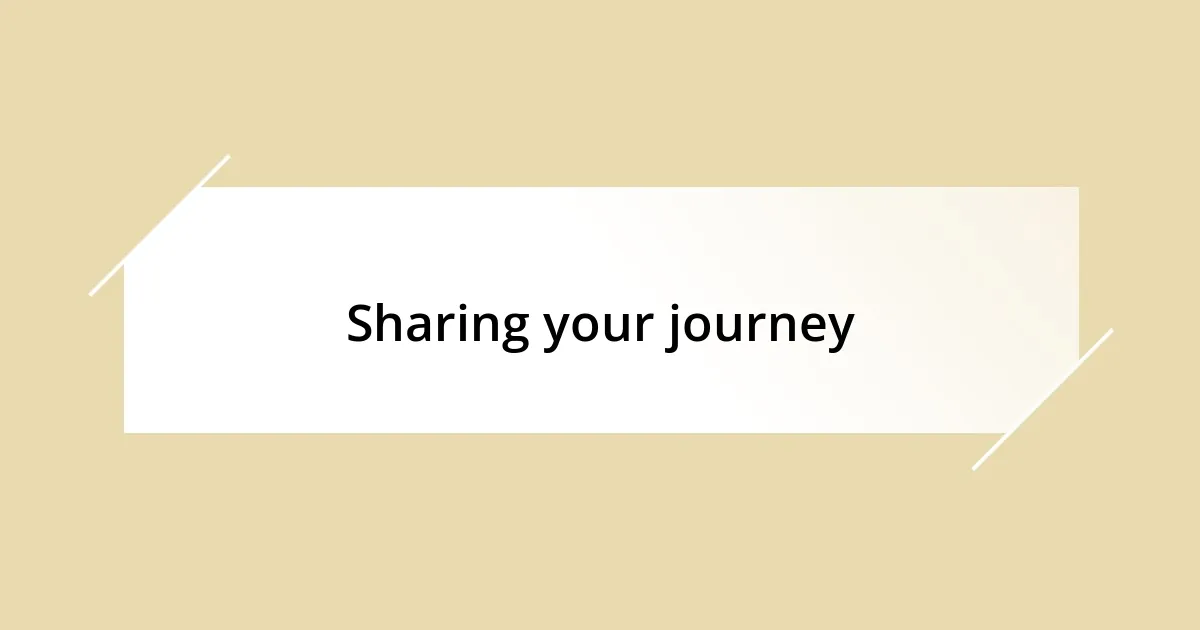
Sharing your journey
Sharing your journey in cultural ceremonies is about more than just participation; it’s about the stories that weave us together. I remember sitting in a circle during a Kwanzaa celebration, where each person shared what the holiday meant to them. Their words painted vivid pictures of family history, resilience, and hope, making me feel like I was part of something far greater than myself. Doesn’t it amaze you how just a few shared experiences can transform strangers into a community?
As I left that gathering, I was struck by how storytelling is a vital thread in the fabric of cultural ceremonies. One participant shared a tale of their ancestors’ struggles, and as they spoke, I felt connected to their journey. It hit me that sharing our journeys, whether joyful or painful, can foster empathy and understanding. Have you ever felt that sense of kinship with someone simply because they opened up about their life? It reminded me of how powerful vulnerability can be.
When I reflect on how sharing my own experiences during these ceremonies has impacted me, I find it deeply enriching. After leading a small discussion about the significance of Lunar New Year traditions, I could sense a shift in the room. Everyone began to share their own family rituals, and what started as a formal gathering turned into a heartfelt exchange filled with laughter and tears. Isn’t it incredible how a shared moment can evoke such a collective spirit? In that space, our differences faded, and we became united by the threads of our unique stories.












